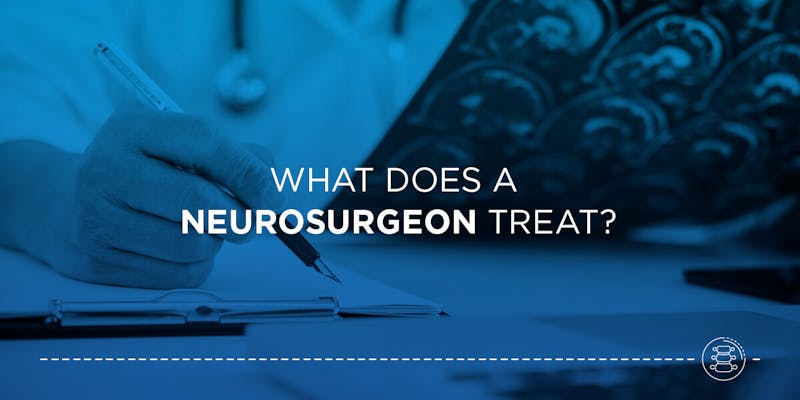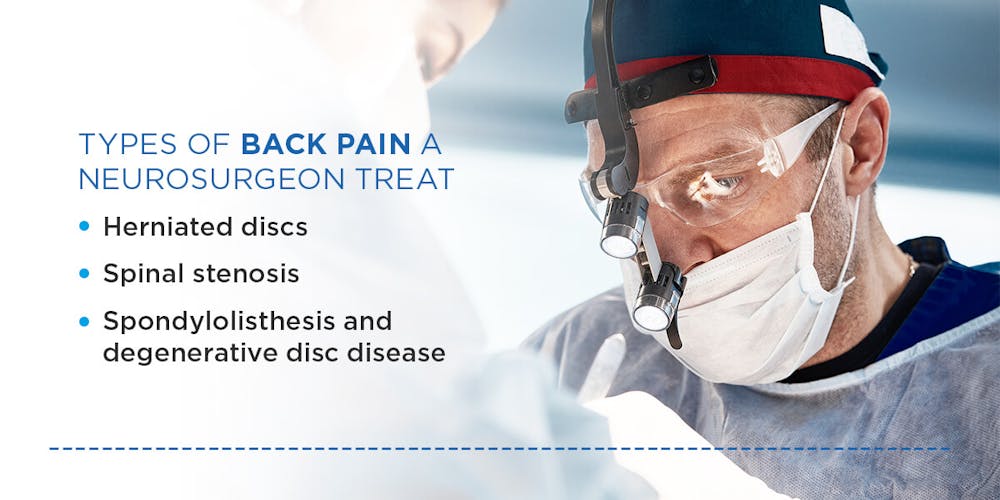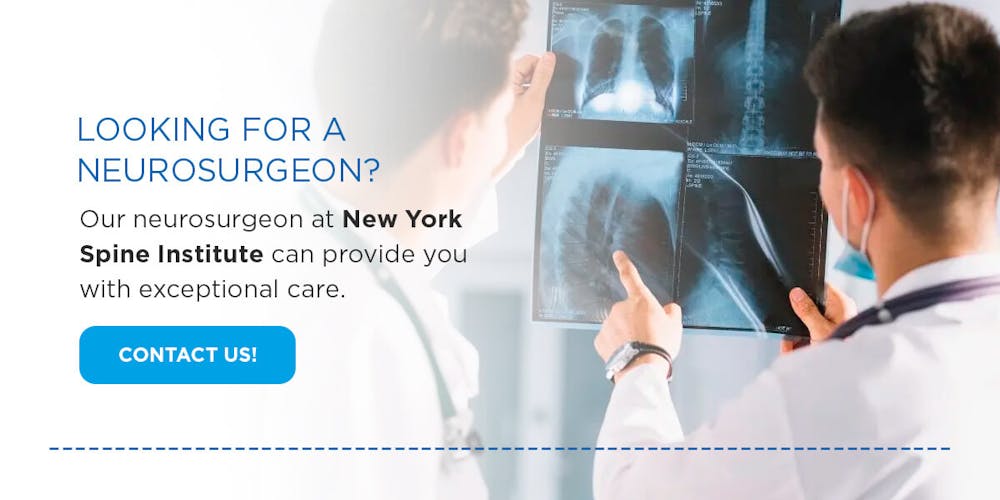
While many people assume a neurosurgeon is synonymous with a brain surgeon, neurosurgeons actually provide care for the entire body. As such, many individuals are surprised to learn what a neurosurgeon can do for them. To find out what a neurosurgeon can do for you, keep reading about what a neurosurgeon is and the treatments they provide.
What Is a Neurosurgeon and What Do They Do?
A neurosurgeon is a medical doctor who specializes in diagnosing, managing and treating conditions affecting the brain, spine and nervous system. Before a doctor becomes a neurosurgeon, they must first complete an intensive education and rigorous training. Their education and training include:
- Four years of pre-medical education at a college or university to obtain a bachelor’s degree.
- Four years of medical school to obtain a Doctor of Medicine (M.D.) or Doctor of Osteopathic Medicine (D.O.) degree.
- One year internship in general surgery.
- Seven years in a neurosurgery residency program.
After completing 16 years of education and training, some neurosurgeons pursue a subspecialty through a fellowship program. These fellowship programs take one to two years to complete and include pediatrics, functional medicine, spine, epilepsy and other areas.
The final step for a neurosurgeon is to take the board certification exam. While board certification is not mandatory for neurosurgeons, it is the highest qualification a neurosurgeon can attain.
What Conditions Can a Neurosurgeon Treat?
Neurosurgeons treat any condition that affects your brain, spinal cord or nerves. In other words, they treat the central nervous system (CNS) and peripheral nervous system (PNS). Your brain and spinal cord comprise your CNS, while the nerves that branch off your brain and spinal cord comprise your PNS. Here are some common types of conditions neurosurgeons treat.
Strokes and Aneurysms
Strokes have two somewhat opposite causes. They are caused by either ruptured blood vessels in the brain or interrupted blood flow to the brain. A stroke caused by a ruptured blood vessel is a hemorrhagic stroke, while the other is an ischemic stroke. Hemorrhagic strokes are closely related to cerebral aneurysms, as both result from weakened artery walls, leading to internal brain bleeding.
However, ischemic strokes are the most common type, accounting for 87% of all strokes. They typically result from arterial blood clots that deprive your brain of oxygen-rich blood.
Brain and Spinal Cord Tumors
As your brain and spinal cord form the basis of your CNS, tumors in these organs can cause widespread effects. However, some tumors are benign and do not cause significant issues, though they may cause some pain and inflammation. A tumor is benign if it does not spread to other body parts. In contrast, malignant tumors invade surrounding tissue. If the tumor begins in the CNS, it is primary. However, it is secondary if it spreads to the CNS from another area. There are more than 120 types of CNS tumors.
Headaches are the most common brain tumor symptom, while back pain is the most common symptom of spinal cord tumors. Other symptoms affecting your motor system and sensory nerves almost always accompany CNS tumors, meaning headaches and back pain alone are not necessarily indications of a CNS tumor. On their own, such symptoms are most likely signs of a far less concerning issue.
Spinal Cord Conditions
Degeneration of bones, ligaments and spinal discs is the primary cause of most spinal cord conditions. These conditions include herniated discs, spinal stenosis, degenerative disc disease (DDD) and others. Other causes include congenital abnormalities or spinal trauma. The most common congenital spinal cord conditions neurosurgeons treat are:
- Spina bifida: This condition is an incomplete closure of the spine and spinal cord at birth.
- Scoliosis: Scoliosis encompasses a sideways curvature of the spine at birth.
- Tethered spinal cord: This is a spinal cord that is tethered to the spinal canal, limiting movement and flexibility.
Head, Neck and Spine Injuries
As CNS specialists, neurosurgeons can treat any head, neck or spine injury. As such, they commonly treat:
- Complete spinal cord injuries (SCI), involving total loss of motor and sensory function below the injured area.
- Incomplete SCI, involving partial loss of function below the injured site.
- Concussions.
- Fractured vertebrae.
- Skull fractures.
- Traumatic brain injuries (TBI), such as a hematoma or contusion.
- Whiplash.
Neurological Disorders
Neurological disorders are any condition affecting your central or peripheral nervous system function. As your nerves span throughout your entire body, neurological disorders can present a vast array of different symptoms. Possible symptoms of neurological disorders include:
- Altered levels of consciousness (ALOC)
- Confusion
- Loss of sensation
- Muscle weakness
- Paralysis
- Poor coordination
- Pain
- Seizures
While you may think of neurological disorders primarily residing in the brain or spinal cord, they can affect any part of the body. Here are a few examples of neurological disorders:
- Dystonia
- Epilepsy or seizure disorders
- Parkinson’s disease
- Peripheral neuropathy
- Phantom limb pain
- Trigeminal or occipital neuralgia

What Types of Back Pain Does a Neurosurgeon Treat?
Neurosurgeons treat any source of back pain affecting the spinal cord or canal. As such, they treat many different types of back pain. Here are just a few examples:
- Herniated discs: Also called ruptured or slipped discs, herniated discs occur when part of a spinal disc ruptures, slips or bulges. Your discs are rubbery cushions between your vertebrae that absorb shock and provide flexibility to your spinal cord. When a disc ruptures, slips or bulges, it causes pain by pinching spinal cord nerves. Degeneration commonly causes herniated discs, but trauma, poor posture, excess weight and heavy lifting are also contributing factors.
- Spinal stenosis: Within your vertebrae are nerve pathways, known as your spinal canal or foramen. When these spaces narrow due to degeneration, bone spurs, herniated discs, trauma or tumors, they put pressure on the nerves running through your spine, causing spinal stenosis.
- Spondylolisthesis and degenerative disc disease: Spondylolisthesis occurs when one vertebra slips over another one beneath it. DDD, also known as spondylosis, is the gradual deterioration of your spinal discs that naturally occurs with age. Advanced DDD often leads to spondylolisthesis.
What Does a Neurosurgeon Do?
Not all conditions affecting the central and peripheral nervous systems require surgery. In fact, many only require surgery as a last resort. Moreover, neurosurgeons often provide non-surgical treatments before pursuing surgery for patients, such as injections, medications or therapy. However, if surgery is required, neurosurgeons are the only medical doctors qualified to provide treatment. Some of those neurosurgical procedures include:
- Anterior Cervical Discectomy and Fusion (ACDF): This neck surgery is performed to remove herniated or degenerative cervical discs. The neurosurgeon makes a small incision in the neck to remove the damaged disc. After removing the disc, they fuse the bones. ACDF is an outpatient procedure that requires several weeks of recovery.
- Craniotomy: A craniotomy is a brain surgery where a neurosurgeon temporarily removes a section of the skull to access the brain. A neurosurgeon may perform a craniotomy to treat brain tumors, TBIs, aneurysms, neuralgia, hemorrhages, stroke or epilepsy. Recovery from a craniotomy generally requires several nights in the hospital and several weeks at home.
- Laminectomy: During a laminectomy, a neurosurgeon removes part or all of a vertebral bone to relieve pressure on the spinal cord or nerves within the spinal canal. Depending on the procedure extent, it usually requires one to two nights in the hospital and a few days to several months of recovery.
- Microdiscectomy: Neurosurgeons perform microdiscectomies to remove part or all of a herniated disc in the lower spine. Microdiscectomy recovery takes six to 12 weeks and a few hours of postoperative hospital care.
- Microvascular Decompression: Microvascular decompression is performed to relieve pressure from pulsating blood vessels on trigeminal nerves in your face. A neurosurgeon removes a small part of the skull behind your ear and places Teflon pieces between the nerve and blood vessel. This procedure requires two nights in the hospital and approximately one month of recovery.
- Minimally Invasive Spine Surgery (MISS): MISS uses smaller incisions than other back surgeries to treat spinal conditions. Using a tubular retractor, a neurosurgeon creates a tunnel to the problem area to insert surgical tools. This outpatient procedure typically has a recovery period of six weeks.
A neurosurgeon can perform numerous other procedures, but these give an overview of some of the surgeries they most commonly do.

